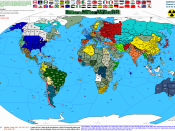The quality and importance of humanity's relationship with the natural world is evident in a comparison between Aldous Huxley's dystopic novel, "Brave New World", and Ridley Scott's futuristic film, Blade Runner. The zeitgeist of each text affects the portrayal of humanity and nature, with each composer extrapolating from their own time elements of contemporary trends which they found disconcerting, into a hypothesized future. Both texts highlight the inextricable link between humanity and nature, and illustrate the consequences of imposing ourself on the natural landscape rather than integrating with it. They do this primarily by showing the negative effects of man interfering with the natural - a loss of humanity, identity and spirituality - but contrast this with the ability of nature to prevail nonetheless. Even though they present us with very different world orders, both texts still have relevance to current audiences, as they offer, through the use of effective stylistic and filmic devices, a warning of a future where the natural rhythms of the world have been corrupted and finally destroyed in place of the monotonous and artificial.
In both texts, nature is understood simply as a force to be dominated, controlled or exploited for the benefit of humanity. This thematic concern of Brave New World stems from Huxley's context of the early twentieth century. The catastrophes of World War I and the economic collapse triggered by the Wall Street crash of 1929 created a time of great instability, inequity and disillusionment, creating a moral vacuum; as a result, society is portrayed as lacking fundamental human qualities, such as spirituality and empathy. The central theme of consumerism is a direct product of the mass production that was being introduced to the western world. Huxley reflects his fear of this new method of production and other scientific advances in removing...


